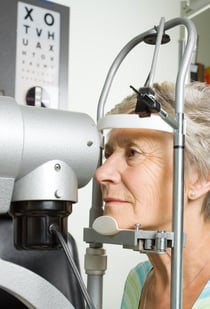11 Tips for Keeping Eyes Healthy
Elizabeth Meyer | Jul 27, 2015
Many people make the assumption that poor vision is something that comes naturally with age. This may be true when it comes to reading and close work, but blurred vision or partial loss of sight is not normal and is usually caused by disease or injury. Don’t put off your eye health – now is the perfect time for older adults to have their eyes checked and learn how to keep their eyes healthy.
Let’s Talk Eye Health
Many problems are discovered and corrected through community awareness of eye health as well as routine health checks. With the help of fundraising and research into cures for low vision, eye diseases, and blindness talking about eye health is more common now than ever. There was an initiative in 1996 to look at better vision health awareness with diabetic related problems. It has now evolved into an awareness campaign that encompasses any and all ailments that can affect vision.
Catching serious eye diseases and disorders like glaucoma and cataracts early makes treatment much more effective. Women are at a slightly higher risk of serious eye disease than men. There is no determined reason in testing, but statistics show it to be the case. Senior-age women in particular should be diligent in getting regular eye exams.

Importance of Keeping Eyes Healthy
It may be true that glasses can correct vision, but there is no cure for blindness or severe vision loss. Typically, once your vision is gone, it is gone. This makes it important to take care of your eyes and have frequent checks to see if there are any problems. Optimal vision will serve you well over the years and ensure you stay safe and are able to live life to the fullest. Adequate vision makes it possible to have a good quality of life and stay independent longer.
Tips for Eye Health
- Have an eye exam at least once every two years, but once annually if you have systemic health problems like high blood pressure or diabetes.
- Get an immediate eye exam if you notice blurred, cloudy, distorted, or loss of vision. This can be a sign of problems, even if it only lasts for a short period of time.
- Avoid tripping or falling, which can cause eye injuries.
- Point spray nozzles for chemicals away from the face and only use them in a well-ventilated area.
- Wear safety goggles when mowing or doing yard or garden work to keep eyes healthy.
- Wear over-sized, UV safe sunglasses for protection from sun and wind.
- Read in well-lit areas and stop when your eyes are feeling strained.
- Eat eye-healthy foods like fish, grains, leafy greens, fruits, and veggies. Nutrients like Vitamins C and E, zinc, and omega-3 fatty acids all play a role in eye health.
- Change and clean contact lenses daily.
- Have any moving shadows or "floaters" checked by a qualified eye doctor.
- Seek professional advice when you are having trouble with your eyes.
Because preventable diseases or injury cause the majority of vision loss, take steps now to make sure you are doing everything you can to keep your eyes healthy and working properly. Part of maintaining your independence and continually enjoying your day-to-day life is the health of your eyes. Never settle for deteriorating health because the world tells you it is part of aging. Research shows that proper eye care can eliminate many of the eye health problems that plague many older adults today.

